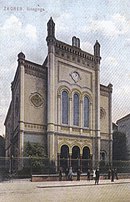Portal:Judaism
The Judaism PortalJudaism (Hebrew: יַהֲדוּת Yahăḏūṯ) is an Abrahamic, monotheistic, and ethnic religion, comprises the collective spiritual, cultural, and legal traditions of the Jewish people. Contemporary Judaism having originated as an organized religion in the Middle East during the Bronze Age, and evolved from Yahwism, the cultic polytheistic religious movement of ancient Israel and Judah, around the 6th/5th century BCE, and is thus considered to be one of the oldest monotheistic religions.[improper synthesis?] Along with Samaritanism, to which it is closely related, Judaism is one of the two oldest Abrahamic religions. Religious Jews regard Judaism as their means of observing the Mosaic covenant, which was established between God and the Israelites, their ancestors. Jewish religious doctrine encompasses a wide body of texts, practices, theological positions, and forms of organization. Among Judaism's core texts is the Torah, the first five books of the Hebrew Bible, a collection of ancient Hebrew scriptures. The Tanakh, known in English as the Hebrew Bible, is also referred to as the "Old Testament" in Christianity. In addition to the original written scripture, the supplemental Oral Torah is represented by later texts, such as the Midrash and the Talmud. The Hebrew-language word torah can mean "teaching", "law", or "instruction", although "Torah" can also be used as a general term that refers to any Jewish text that expands or elaborates on the original Five Books of Moses. Representing the core of the Jewish spiritual and religious tradition, the Torah is a term and a set of teachings that are explicitly self-positioned as encompassing at least seventy, and potentially infinite, facets and interpretations. Judaism's texts, traditions, and values strongly influenced later Abrahamic religions, including Christianity and Islam. Hebraism, like Hellenism, played a seminal role in the formation of Western civilization through its impact as a core background element of Early Christianity. (Full article...) Selected ArticleShemini Atzeret is a Jewish holiday. It is celebrated on the 22nd day of the Hebrew month of Tishrei in the land of Israel, and on the 22nd and 23rd outside the land. In the Tanakh and Talmud, Shemini Atzeret is somewhat connected to the festival of Sukkot, which it directly follows. At the same time, it is considered to be a separate festival in its own right. Outside the land of Israel, this is further complicated by the additional day of Biblical holidays. The first day of Shemini Atzeret therefore coincides with the eighth day of Sukkot outside of Israel. The celebration of Simchat Torah is the most distinctive feature of the holiday, but it is a later rabbinical innovation. In Israel, the celebrations of Shemini Atzeret and Simchat Torah are combined on a single day. In the Diaspora, the celebration of Simchat Torah is deferred to the second day of the holiday. Commonly, only the first day is referred to as Shemini Atzeret, while the second is called Simchat Torah. The holiday also features the prayers Yizkor and Geshem. (Read more...) Did You Know?Did you know...
Related Categories
Featured Articles
Related PortalsHistory ArticleThe Zagreb Synagogue was the main place of worship for the Jewish community of Zagreb in modern-day Croatia, from its construction in 1867 in the Kingdom of Croatia-Slavonia within the Austrian Empire, until its demolition by the fascist authorities in 1941 in the Axis-aligned Independent State of Croatia. The Moorish Revival synagogue was located on modern-day Praška Street and has been the only purpose-built Jewish house of worship in the history of the city. It was one of the city's most prominent public buildings, as well as one of the most esteemed examples of synagogue architecture in the region. Since the 1980s, plans have been made to rebuild the synagogue in its original location, but due to various political circumstances, very limited progress has been made. The current major disagreements which inhibit the construction of a new synagogue concern the involvement of Jewish organizations in the reconstruction and the design and character of the new building. (Read more...) Picture of the Week A chart for the Counting of the Omer, depicting the number of days in the omer (top) and its equivalent in number of weeks (middle) and days (bottom) In the News
Featured Quote
WikiProjectsThings You Can Do
Weekly Torah Portion
TopicsAssociated WikimediaThe following Wikimedia Foundation sister projects provide more on this subject:
Discover Wikipedia using portals | |||||||||


























